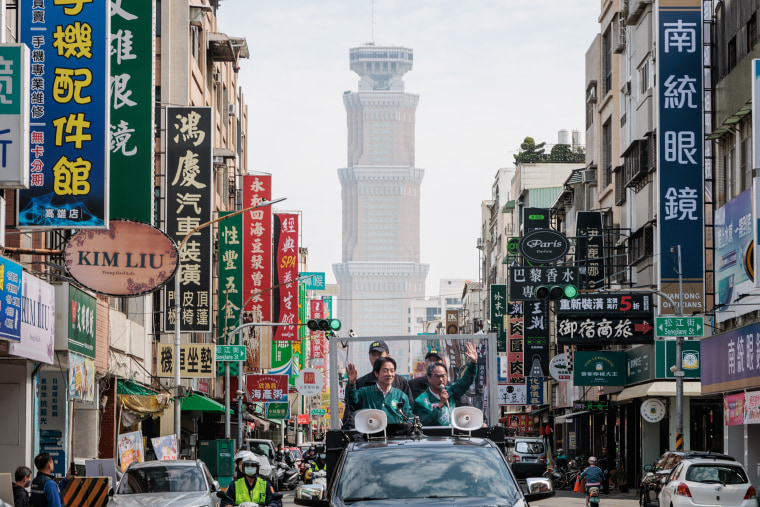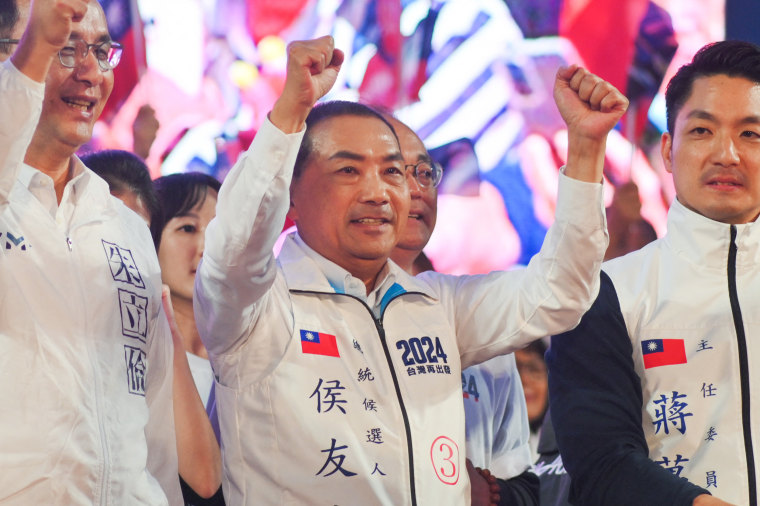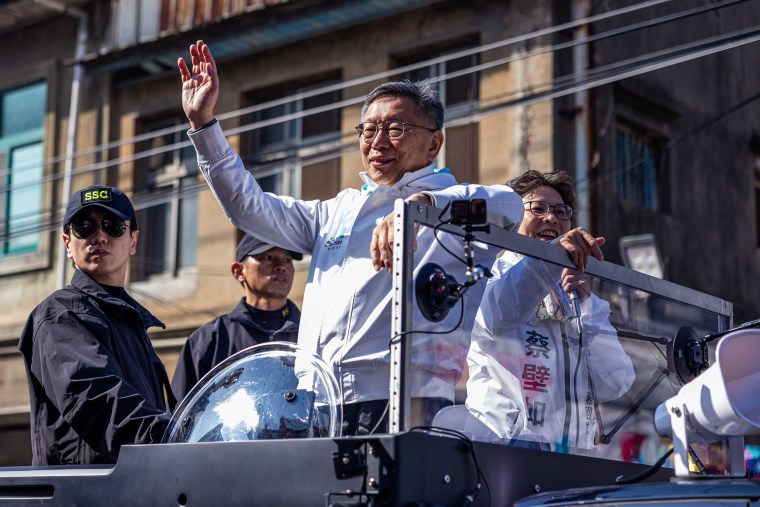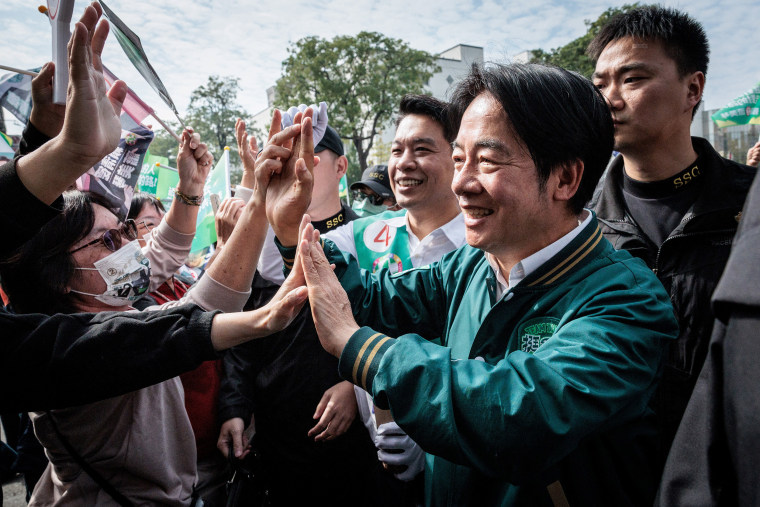TAIPEI, Taiwan — 2024 is a year of pivotal elections, and not just in the United States.
Among the first up is Taiwan, a Beijing-claimed island that is one of the strongest democracies in Asia. Polls are open for voters to elect a new president to replace Tsai Ing-wen, who is limited to two terms.
A key issue for the three men vying to succeed her, all of whom spoke with NBC News, is how they would approach relations with an increasingly aggressive China, which has not ruled out the use of force against Taiwan and has framed the election as “a choice between war and peace.”
This election is Taiwan’s opportunity to balance its position between the U.S., its most important international backer, and China, its largest trading partner, said Wen-Ti Sung, a nonresident fellow at the Atlantic Council who is based in Taipei.
“Having strong relations, close ties with both sides, it’s really caught in the middle,” he said.
What’s at stake?
Since the People’s Republic of China was founded in 1949 after a civil war, its ruling Communist Party has claimed sovereignty over Taiwan, where the defeated Nationalist forces set up a rival government. Under its long-standing “One China” policy, the U.S. recognizes Beijing as the sole legitimate government of China but maintains unofficial relations with Taipei, providing it with defensive weapons.
Most of Taiwan’s 24 million people are in favor of maintaining the status quo, neither formally declaring independence nor becoming part of China.
The status of Taiwan is among the biggest flashpoints in relations between the U.S. and China, the world’s two largest economies. While the U.S. says it has no preferred candidate in the Taiwan election, China has warned the U.S. against intervening in what it calls an “internal affair.”
Earlier this week, the island’s defense ministry issued an air raid alert saying China had launched a satellite, in a sign of the heightened caution in Taiwan ahead of the election.
Beijing has kept up near-daily military pressure on Taiwan, with the island’s defense ministry saying on Tuesday it had detected 10 Chinese military aircraft and four Chinese military ships around the island in the previous 24 hours. The ministry also detected four Chinese balloons, the latest in a series that have been reported over the Taiwan Strait since last month.
Taiwan’s defense ministry said Saturday that the balloons were a threat to international aviation safety and an attempt to unnerve the Taiwanese public. Asked about the potential threat to aviation safety on Monday, Chinese Foreign Ministry spokesperson Mao Ning said she was “not aware” of the situation. The Chinese Defense Ministry did not respond to a request for comment.
Taiwan says China is also trying to influence the election through economic pressure and disinformation campaigns. China in turn has accused Taiwan’s governing Democratic Progressive Party (DPP), which is considered the least friendly to Beijing, of “hyping up the threat from the mainland” ahead of the election to gain voter support.
Sung described Taiwan’s security situation as “urgent but not immediate.”
“China certainly has geopolitical ambition towards Taiwan,” he said. “However, what exact timing Beijing is going to put its threat into actual military invasion, that remains something to be determined.”
The relationship with China is far from the only issue on the minds of Taiwanese voters, many of whom are more concerned with domestic matters such as education, employment, the cost of housing and growing income inequality.
“For the younger voters, those who are fresh out of university who are trying to find their first job or trying to buy their first house or first apartment, they still feel that the benefits of economic growth haven’t quite trickled down enough yet,” Sung said.

Who are the candidates?
The front-runner among the three main candidates is Lai Ching-te of the DPP, a former physician who is Tsai’s vice president. China cut off high-level talks with Taiwan after Tsai, whom it views as a pro-independence figure, was elected in 2016.
Lai, 64, is seen as the candidate most likely to continue Taiwan’s current approach to China, including robust engagement with the U.S. and other democracies. He is also the candidate most disliked by Beijing, which describes him as a separatist and a “troublemaker.”
“Our belief is, we have to go to the world and trust in Taiwan and collaborate with the international community. We must not go back to China,” Lai said in an interview in December.

On the opposite end of the political spectrum is Hou Yu-ih from Taiwan’s main opposition party, the Kuomintang (KMT), which favors closer relations with China and argues the DPP is courting conflict with its policies.
“I have always maintained that Taiwan must create peaceful relations with mainland China,” Hou — a former police chief and the mayor of New Taipei City, which surrounds the capital — said in an interview via a translator.
Hou, 66, added that Taiwan should deter Chinese military aggression by increasing its defense capabilities and its own military preparedness.

The third candidate, from the center-left Taiwan People’s Party (TPP), is Ko Wen-je, 64, a former surgeon who as mayor of Taipei promoted ties with the Chinese city of Shanghai. An effort by the KMT and TPP to agree on a united presidential ticket failed on live television late last year.
“It’s about finding a balance between the two and it’s very challenging,” Ko said in an interview. “This is the toughest job for the Taiwanese president — finding a balance between the U.S. and China.”
Since Ko founded the TPP four years ago, the upstart populist party has gained support among voters who are dissatisfied with the usual two choices.
“Since the KMT and DPP have been in power for a long time, I would like to have a new ruler who is not bound by the two parties,” San Wei, 30, said at a TPP rally in December.
Janis Mackey Frayer reported from Taipei, Taiwan, and Jay Ganglani and Alice Kong reported from Hong Kong.

